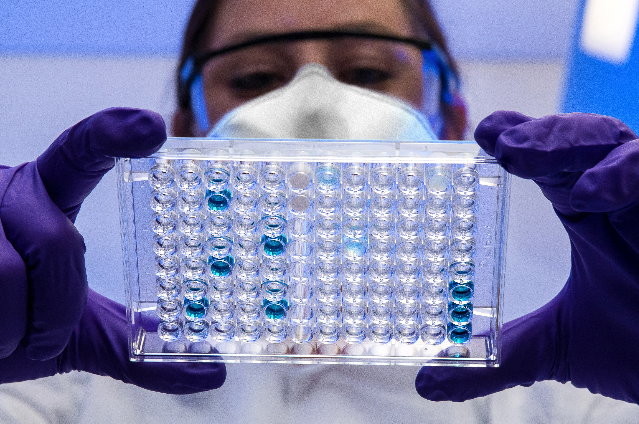DISCOVERING SCIENCE
'Science is not a magic, but logic'
Science provides a reason for every event on Earth. It gives evidence as to why something happens and thus eradicates the dominance of simple magic from one's mind. Science always gives definition for the undefined, gives reason for the unreasonable and helps in imagining the unimaginable. Science is limitless like the Universe. Science suggests a person to prove each and every principle practically and not just learning it theoretically. Those who understands Science, Science makes them understand the world. Science makes one believe that mere discoveries not only make a person famous but unravel the untold mystery in front of others. Science is a systematic enterprise that builds and organizes knowledge in the form of testable explanations and predictions about the Universe.

IMPORTANCE OF RESEARCH
'What is research, but a blind date with knowledge' quoted by William is quite evident. It is quite true that we cannot think about science without research. Obviously, all the laws and hypothesis given so far are all research-based. Science is always linked to research. These two accompany each other. Research is a systematic inquiry to describe, explain, predict and control the observed phenomenon. It is a creative work undertaken to increase the stock of knowledge. Research helps in establishing a firm evidence which would support or deny a thesis. Research proves to be the base of science. Without research, the entire frame of science would demolish. All the theories and laws have so far been explained through research. Some well known research is truly remarkable in the field of science like:
- The X box adaptive Controller is a recent invention which helps those with limited hand and arm mobility to play games.
- Gravity Blanket is another invention. Gravity created a therapeutic weighted blanket engineered to be around 10% o our body weight. This helps those with sleeping problem, who may be stressed or dealing with anxiety.
- The California-based startup 'Zipline' tends to use drones to save lives. Their latest drone invention can carry upto 2kgs at 128kmph for upto 160km round trip.
BASIC RESEARCH
Scientific research can be labeled as either basic or applied research. Basic research is commonly the search for knowledge and applied research is the search for solutions to practical problems using this knowledge. Basic science refers to the highly skilled laboratory-based research needed to understand cellular or molecular mechanisms underlying a disorder. A great deal of our understanding comes from the curiosity-driven undertaking of basic research. This leads to options for technological advance that were not planned or sometimes even imaginable. Scientific research involves using the scientific method, which seeks to objectively explain the events of nature in a reproducible way. Basic research is performed without the thought of practical ends. It results in general knowledge and understanding of nature and it's laws. Many of the most important discoveries have been possible as a result of experiments undertaken with many different purposes in mind.
Basic research leads to new knowledge. It provides scientific capital and fund from which practical applications of knowledge must be drawn. Today, basic research is the pacemaker of technological progress. Basic research advances fundamental knowledge about the world. It focus on creating and refuting or supporting theories which explain an observed phenomenon.
Basic research generates new principles and theories which may not be immediately utilized but nonetheless form the basis of progress and development in different fields. It stimulates new ways of thinking that have the potential to improve how practitioners will deal with a problem in future. Basic science research helps us understand how the world works and learn more about the human body. It can teach us about the many biological and genetic processes that happen inside human body. Discoveries from basic research can be used to find common causes of diseases that some people are born with. Scientists can develop better diagnosis and better tests for diagnosing a disease over time. One of the best examples of basic science research in genetics is the Human Genome Project. The goal of the project was to find all genes in human DNA. It led to an entire field of science-Genomics-and countless innovations in medicine. Basic science is the heart of the 'Drug discovery' process which allow scientists to uncover faulty biological pathways that can be targeted to treat a condition. The classical work of the great pioneers in science ranging from Galileo to Linus Pauling all was pure basic science. Nevertheless, research studies in modern basic science typically are seen as ridiculous or worthless by ordinary adults. But new knowledge from basic science studies often becomes useful and important when it generates later research in applied science and engineering. The basis of all later developments in applied science is open research in basic science. One example of this s the 'Transistor'. When transistors were first made, they were viewed as 'lab curiosities' that had no potential for practical usage. None foresaw their eventual revolutionary significance for the electronic devices and computers in today's world. The past two or three years have seen a wide array of astonishing inventions. During the past few decades, however another goal of science has emerged: to find a way to rationally use natural resources to guarantee their continuity of humanity itself; an endeavor that is currently referred to as 'Sustainability'.
TRANSLATIONAL RESEARCH
As defined by the NIH National Center for Advancing Translational Sciences (NCATS) translation is the 'process of turning observations in the laboratory, clinic and community into interventions that improve the health of individuals.
Translational Research often termed as Translational Science or Translational Medicine is a bidirectional process involving multidisciplinary integration among basic, clinical, practice, population and policy-based research. It adopts a scientific investigation or enquiry into a given problem facing medical/health practices to surmount problem which helps to raise aggregate health performances. The concept of translational research has become critically important in contemporary biomedical research and practices. Translational research as a whole- adopts a scientific approach; involves innovative investigation/enquiry; and is geared towards improved performance. Translational research is an effective translation of new knowledge, mechanisms and techniques generated by advances in basic science research into new approaches for prevention, diagnosis and treatment of diseases. The primary focus of translational research is on dissemination and implementation of research or systematic study of processes and factors which lead to widespread use and integration of proof-based involvement into real world clinical and contemporary settings. It has the potential to enhance the lifespan and health-span beyond the boundaries of traditional disease-based research.

The medical benefits of the current revolution in biology cannot be achieved without vigorous and effective translation. The translation of basic biological discoveries into clinical applications improve human health. The concept of translational research, that aims to facilitate the application of basic scientific discoveries in clinical and community settings is currently in demand. While there are powerful forces driving this trend, support for translational research must be accompanied by a robust investment in basic science. This provides the essential raw material for translation and continues to represent humanity's best hope to meet a wide range of public health challenges. It is important to critically examine the translational research in order to maximize the likelihood that basic science research performed in laboratory and clinic benefits the public. Examining the concepts of translational research from the perspective of evaluators are charged with translational efforts. One of the major tasks for evaluators involved in it is the aim to reduce the time it takes to move research into practice and health impacts. Another task is to increase the rate and volume of translation. The ultimate goal of translational biomedical research is to improve human health - an outcome that benefits the society. Participating in translational research has also more direct and immediate rewards for individual investigators and the institutions that support their work. Collaboration and technology have been twin drivers of recent quantum leaps in the quality and quantity of translational research.
TEAMWORK OF OF BASIC RESEARCH AND TRANSLATIONAL RESEARCH
Basic research is the type that is not always practical but often leads to greater discoveries. Translational research refines these discoveries into useful products. And so basic research discoveries such as semiconductors and double-helix structure of DNA, have revolutionized electronics and biology making possible the molecular research to which many of us have devoted our careers. Scientists that formerly worked solely on basic biological mechanisms found greater freedom to develop their resources along more practical lines, with the encouragement of their institutions. Universities understood that it was easier to connect with the public as well as with potential benefactors by emphasizing on their translational advances rather than their basic science discoveries. Translational research generates revenue, bring publicity n enhance public relation. The importance of basic science derives from its contribution to deeper knowledge within the tree of information and its greater potential to integrate with other areas of research. Hence, we do not view basic and translational science as one being more important than the other but rather as complementary areas of human endeavor, with the distinction that basic science findings often precede advances in translational science.
IMPACT ON SOCIETY
"Discoveries pertinent to medical practices have often come from remote and unexpected sources and it is certain that this will be true in future".
If the current emphasis on translational research leads to more scientific applications that benefits human society, that will be all for the better. In our own less patient times, we note that retroviruses were discovered long before they were associated with human disease and that the dizzyingly rapid development of effective 'antiretroviral therapy' against HIV was possible only because basic science had already provided the framework for rapid diagnosis and drug development.
The science community must educate politicians and public about how science really works, emphasize the complementary relationship between basic and translational research and advocate more stable and sustained support of the nation's scientific enterprise. Our goal in this commentary is not to pit translational versus basic research but rather to draw renewed attention to tenuous present condition of basic research which will continue to be the engine driving humanity's hopes for curing disease, increasing productivity, eliminating poverty, developing renewable sources of energy, sustaining agriculture etc. Until the pendulum swings and basic science reemerges as a national priority, basic scientists will have to be imaginative in promoting the potential translational applications of their research and develop new methods to humanize their work.
Some renowned research which led to a greater impact in society:
- Soft wearable health monitor uses stretchable electronics- could allow comfortable, long term health monitoring of adults, babies and small children without the concern of skin injury or allergic reactions caused by conventional adhesive sensors with conductive gels.
- Marijuana exposure leads to damage in the cells of inner lining of heart and vascular system. Antioxidant compounds from soya beans may prevent marijuana as revealed after intensive laboratory work.
- Biomedical engineers are working on their way to develop a prosthetic arm for amputees that can respond to external stimulus and feel the sensation of touch via an array of electrodes implanted in the muscles o the patient.
- Virtual robots have been successful in paving their way among the human race. They have almost been used in every sector of work and are working with excellence.
CONCLUSION
Thus, do not just learn up quoted words or statements, induce the habit of proving those statements through your knowledge and discover your own self. Who knows your observation may turn into a discovery one perfect time! So do not believe in black magic or rather black science, erase black and purify the definition of science.
